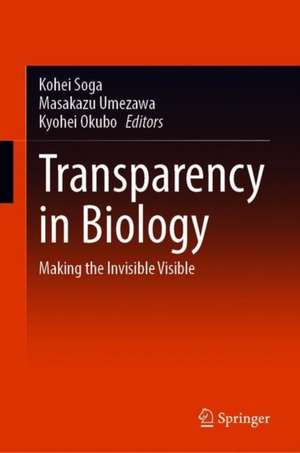Transparency in Biology: Making the Invisible Visible
Editat de Kohei Soga, Masakazu Umezawa, Kyohei Okuboen Limba Engleză Hardback – 22 dec 2020
| Toate formatele și edițiile | Preț | Express |
|---|---|---|
| Paperback (1) | 888.97 lei 6-8 săpt. | |
| Springer Nature Singapore – 23 dec 2021 | 888.97 lei 6-8 săpt. | |
| Hardback (1) | 894.97 lei 6-8 săpt. | |
| Springer Nature Singapore – 22 dec 2020 | 894.97 lei 6-8 săpt. |
Preț: 894.97 lei
Preț vechi: 1091.42 lei
-18% Nou
Puncte Express: 1342
Preț estimativ în valută:
171.25€ • 178.80$ • 141.73£
171.25€ • 178.80$ • 141.73£
Carte tipărită la comandă
Livrare economică 04-18 aprilie
Preluare comenzi: 021 569.72.76
Specificații
ISBN-13: 9789811596261
ISBN-10: 9811596263
Pagini: 263
Ilustrații: VIII, 263 p. 121 illus., 100 illus. in color.
Dimensiuni: 155 x 235 mm
Greutate: 0.56 kg
Ediția:1st ed. 2021
Editura: Springer Nature Singapore
Colecția Springer
Locul publicării:Singapore, Singapore
ISBN-10: 9811596263
Pagini: 263
Ilustrații: VIII, 263 p. 121 illus., 100 illus. in color.
Dimensiuni: 155 x 235 mm
Greutate: 0.56 kg
Ediția:1st ed. 2021
Editura: Springer Nature Singapore
Colecția Springer
Locul publicării:Singapore, Singapore
Cuprins
Part I: Introduction to Transparency.- 1. Introduction.- Part II: NIR-Fluorescence Imaging and Phosphors.- 2. Requirements of Nano-Structures for Bioimaging Probes.- 3. Organic Dyes.- 4. Quantum Dots.- 5. Carbon Nanotubes.- 6. RED-CNPs.- Part III: Application of NIR Light for Bioimaging.- 7. Nanothermometry.- 8. Multi Modal Imaging.- Part IV: Application of NIR Light for Medical Photonics.- 9. Photo Dynamic Therapy.- 10. Hyper Spectral Imaging.
Notă biografică
Kohei Soga started his research on rare-earth-doped luminescent materials in 1990 as a graduate student of the University of Tokyo. His thesis concentrated on relating the spectroscopic properties of the rare-earth ions and the structure of the host glass. After obtaining his Ph.D. degree in 1995, he expanded his research onto the photonic applications, especially on that relating to optical communication. Since 2004, he has focussed his research on the interdisciplinary fields of bio- and nano-photonics with the aim to develop a biophotonic system with near-infrared excitation.
Masakazu Umezawa received his M.Pharm. (2008) and Ph.D. (2010) degrees under the supervision of Prof. Ken Takeda in Pharmaceutical Sciences from Tokyo University of Science. He worked as a Postdoctoral Fellow, Assistant Professor, and Junior Associate Professor until 2016 and then joined the Department of Materials Science and Technology, Tokyo University of Science, as a Project Research Associate to promote the research on “deeper and precise fluorescence bioimaging through the second biological window (SBW)” supervised by Prof. Kohei Soga. His research interests are “nano-bio” interactions for the designing of safer and functionalized nanomaterials and their biomedical applications.
Kyohei Okubo received his M.E. and Ph.D. degrees from the University of Tsukuba, Japan, in 2014 and 2017, respectively. From 2017 to 2018, he has worked in the University of Tokyo as Japanese Society of Promotion and Science (JSPS) Postdoctoral Researcher. In 2018, he joined the Department of Materials Science and Technology, Tokyo University of Science, as an Assistant Professor. He is currently involved in the development of near-infrared bioimaging and biomedical devices.
Textul de pe ultima copertă
This book explains transparency in biology with emphasis on bending and absorption, which together are the essence of transparency. The reader is provided with an understanding of why the interior of the body can be made to appear transparent through the application of elementary physics. Based on the principle of transparency, emerging imaging techniques using near-infrared light to view the body transparently are explained with examples such as cancer detection and temperature imaging of deep tissues. This book is useful to many researchers, including biologists, physicists, chemists, materials scientists, and device engineers as well as developers—all who seek a deep understanding of transparency in bioimaging.
Caracteristici
Is the first book to focus on the transparency of biological tissues Provides part of the content on video accessible on the internet Serves useful to undergraduate students with only a knowledge of elementary physics
